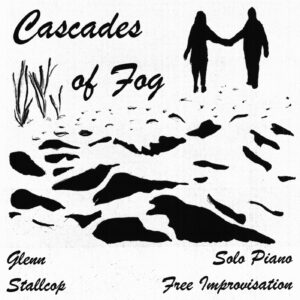Glenn Stallcop Composer, Performer


A piano album concerning the uncertainty of our Future
A dialogue with memories; losing touch with one’s foundations.
Cascades Of Fog was recorded in January of 2007. The previous year had been one of multiple personal tragedies and had left me in a daze. I treated the opportunity to record this group of improvisations as both an emotional outlet and a source of healing. Some of these improvisations are rather dark, but more often, they are simply reflective. I had no regrets, really, but did need time to work out the sense of loss.
The metaphor of “cascades of fog” is much more appropriate than, say, “waves of anguish.” I had not lost my way, but maybe I was just a little bit hesitant. The music suggests a dialog with memories, losing touch with ones foundation, turbulence, mystery, fantasy, and a maybe little romance.
Though the music on this album is freely improvised, it is more classical than jazz (certain free jazz/improvisation artists excepted). I am a classical musician by trade, and have been a composer since I was very young. I am more prone to spontaneously compose while improvising rather than to “groove” as a jazz musician would. I treat rhythm and harmony freely and in a complex fashion at times. However, my music is always expressive. It is the direct emotional and spontaneous outpouring that drew me to improvisation in the first place.
I also use improvisation as a spiritual practice. The act of improvisation forces me to concentrate all of my attention on what I am doing now, not on what I just did, what I am going to do, or what I was planning to do. As such, my music always has a certain meditative quality, a certain inner stillness, even when it gets busy. There cannot be fog without silence.
this album reverberates through some literary terrain.
A dialogue with memories; losing touch with one’s foundations.
A dialog with memories, losing touch with one’s foundation.
Cascades Of Fog was recorded in January of 2007. The previous year had been one of multiple personal tragedies and had left me in a daze. I treated the opportunity to record this group of improvisations as both an emotional outlet and a source of healing. Some of these improvisations are rather dark, but more often, they are simply reflective. I had no regrets, really, but did need time to work out the sense of loss.
The metaphor of “cascades of fog” is much more appropriate than, say, “waves of anguish.” I had not lost my way, but maybe I was just a little bit hesitant. The music suggests a dialog with memories, losing touch with ones foundation, turbulence, mystery, fantasy, and a maybe little romance.
Though the music on this album is freely improvised, it is more classical than jazz (certain free jazz/improvisation artists excepted). I am a classical musician by trade, and have been a composer since I was very young. I am more prone to spontaneously compose while improvising rather than to “groove” as a jazz musician would. I treat rhythm and harmony freely and in a complex fashion at times. However, my music is always expressive. It is the direct emotional and spontaneous outpouring that drew me to improvisation in the first place.
I also use improvisation as a spiritual practice. The act of improvisation forces me to concentrate all of my attention on what I am doing now, not on what I just did, what I am going to do, or what I was planning to do. As such, my music always has a certain meditative quality, a certain inner stillness, even when it gets busy. There cannot be fog without silence.